Although the new month has begun with a strong upwards day, price remains range bound and below resistance.
Summary: Resistance is currently about 1,565 and support is about 1,525. A close above resistance with support from volume would indicate more upwards movement to either 1,572 or the classic analysis target at 1,660.
The bullish wave count now allows for a slight new high before a reversal and swing down to about 1,470.
Grand SuperCycle analysis is here.
Monthly charts were last published here with video here.
BEARISH ELLIOTT WAVE COUNT
WEEKLY CHART
It is possible that Super Cycle wave (b) is completing as a double zigzag.
The first zigzag in the double is labelled cycle wave w. The double is joined by a three in the opposite direction, a triangle labelled cycle wave x. The second zigzag in the double is labelled cycle wave y.
Cycle wave y may now be a complete zigzag, or it may yet continue a little higher.
The purpose of the second zigzag in a double is to deepen the correction. Cycle wave y has achieved this purpose.
1,481.91 is the start of intermediate wave (5) within primary wave C. A new low below 1,481.91 could not be a second wave correction within intermediate wave (5), so at that stage intermediate wave (5) would have to be over.
1,401.30 is the start of primary wave C. A new low below this point could not be a second wave correction within primary wave C, so at that stage primary wave C would be confirmed as over.
A new low below 1,346.45 would invalidate the bullish wave count below and add confidence to a bearish wave count.
A new wide best fit channel is added in light blue (thank you to Dreamer for pointing this out). This channel contains all of Super Cycle wave (b) and may currently provide strong resistance. Copy this channel over to daily charts.
DAILY CHART
Within cycle wave y, the triangle that ended on the 17th of July may have been primary wave B. Primary wave C may have begun there. Primary wave C must subdivide as a five wave structure; it could be a complete impulse.
Within cycle wave y, there is no Fibonacci Ratio between primary waves A and C.
Within primary wave C, intermediate wave (3) is just 0.33 longer than 2.618 the length of intermediate wave (1). If intermediate wave (5) is over at the last high, then it exhibits no Fibonacci ratio to either of intermediate waves (1) or (3).
A breach of the best fit trend channel by downwards movement would be a very strong indication of a major trend change.
There are two hourly charts below. The first follows labelling from this main wave count. The alternate moves the degree of labelling within intermediate wave (5) down one degree and considers the possibility that it was not over at the last high.
MAIN HOURLY CHART
Intermediate wave (5) may now be a complete five wave impulse.
If there has been a trend change at Super Cycle degree, then a five down should develop at all of hourly, daily and weekly time frames. It would be labelled minor wave 1 at the hourly chart time frame.
Within minor wave 1, minute wave i may be complete.
Minute wave ii may be continuing higher as either an expanded flat or (as labelled) a double combination. Minute wave ii may not move beyond the start of minute wave i above 1,552.65.
ALTERNATE HOURLY CHART
This alternate wave count moves the degree of labelling within intermediate wave (5) down one degree to see the structure incomplete. Only minor wave 1 within intermediate wave (5) may be over at the last high.
Minor wave 2 may now be complete. Minor wave 3 must move move above the end of minor wave 1.
Within minor wave 3, minute waves i and ii may be complete. Minute wave iv may not move into minute wave i price territory below 1,532.06.
The target for Super Cycle wave (b) to end remains the same.
BULLISH ELLIOTT WAVE COUNT
WEEKLY CHART
This wave count sees the the bear market complete at the last major low for Gold in November 2015.
If Gold is in a new bull market, then it should begin with a five wave structure upwards on the weekly chart. However, the biggest problem with this wave count is the structure labelled cycle wave I because this wave count must see it as a five wave structure, but it looks more like a three wave structure.
Commodities often exhibit swift strong fifth waves that force the fourth wave corrections coming just prior and just after to be more brief and shallow than their counterpart second waves. It is unusual for a commodity to exhibit a quick second wave and a more time consuming fourth wave, and this is how cycle wave I is labelled. This wave count still suffers from this very substantial problem, and for this reason the bearish wave count is still considered because it has a better fit in terms of Elliott wave structure.
Cycle wave II subdivides well as a double combination: zigzag – X – expanded flat.
Cycle wave III may have begun. Within cycle wave III, primary waves 1 and 2 may now be complete. Primary wave 3 has now moved above the end of primary wave 1 meeting a core Elliott wave rule. It has now moved far enough to allow room for primary wave 4 to unfold and remain above primary wave 1 price territory. Primary wave 4 may not move into primary wave 1 price territory below 1,346.45.
Cycle wave III so far for this wave count would have been underway now for 55 weeks. It is beginning to exhibit some support from volume and increasing ATR. This wave count now has some support from classic technical analysis.
The channel drawn about cycle wave III is an Elliott channel. Primary wave 4 may find support about the lower edge if it is time consuming enough.
Add the wide best fit channel to weekly and daily charts.
DAILY CHART
Primary wave 4 may be continuing as an expanded flat, which is a common corrective structure. This would see alternation in structure with the zigzag of primary wave 2.
Primary wave 2 lasted 43 sessions. Primary wave 4 may be expected to be more brief; Gold usually exhibits more brief fourth waves than their counterpart second waves. Primary wave 4 may end in a total Fibonacci 21 or 34 sessions. So far it has lasted 15 sessions.
Primary wave 4 may not move into primary wave 1 price territory below 1,346.45.
Today the degree of labelling within intermediate wave (B) is moved down one degree. Intermediate wave (B) may be continuing higher. There is no Elliott wave rule which states a limit for B waves within flat corrections, so there is no upper invalidation point for this wave count.
B waves should be identifiable by weak volume, momentum or ATR.
HOURLY CHART
Within expanded flat corrections, wave B is commonly from 1 to 1.38 times the length of wave A. For this example, intermediate wave (B) is still within the most common length.
When intermediate wave (B) may be complete, then a target may be calculated for intermediate wave (C). The most likely target may be close to the 0.236 Fibonacci Ratio of primary wave 3.
TECHNICAL ANALYSIS
WEEKLY CHART
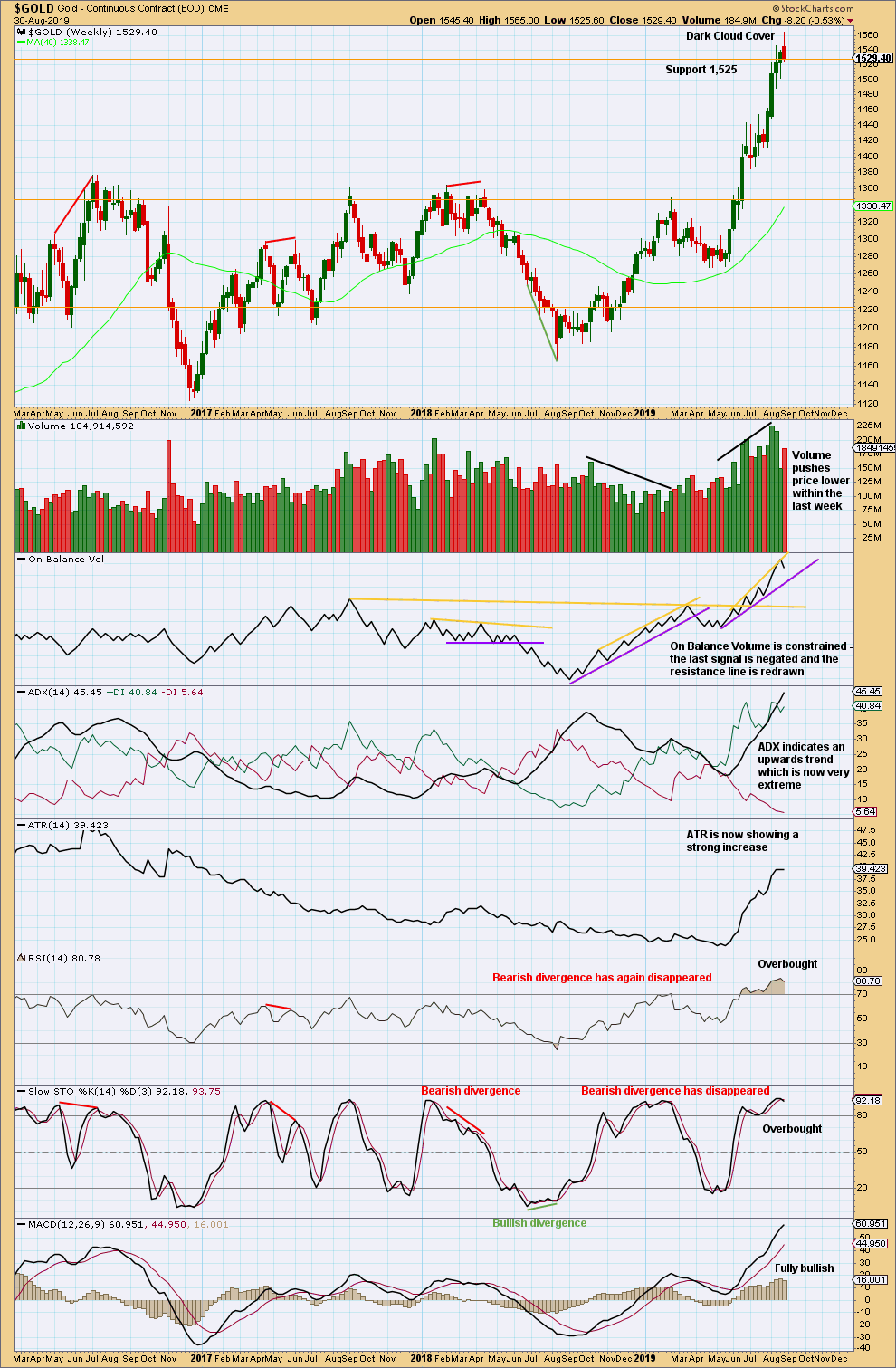
Click chart to enlarge. Chart courtesy of StockCharts.com.
When trends reach very extreme, candlestick reversal patterns should be given weight. The Dark Cloud Cover bearish reversal pattern is given more bearish weight from the long upper wick.
The risk of a major high and a trend change or a large time consuming consolidation developing here is very high. These two scenarios effectively follow the main bearish wave count (major trend change) or bullish wave count (a large time consuming consolidation).
DAILY CHART
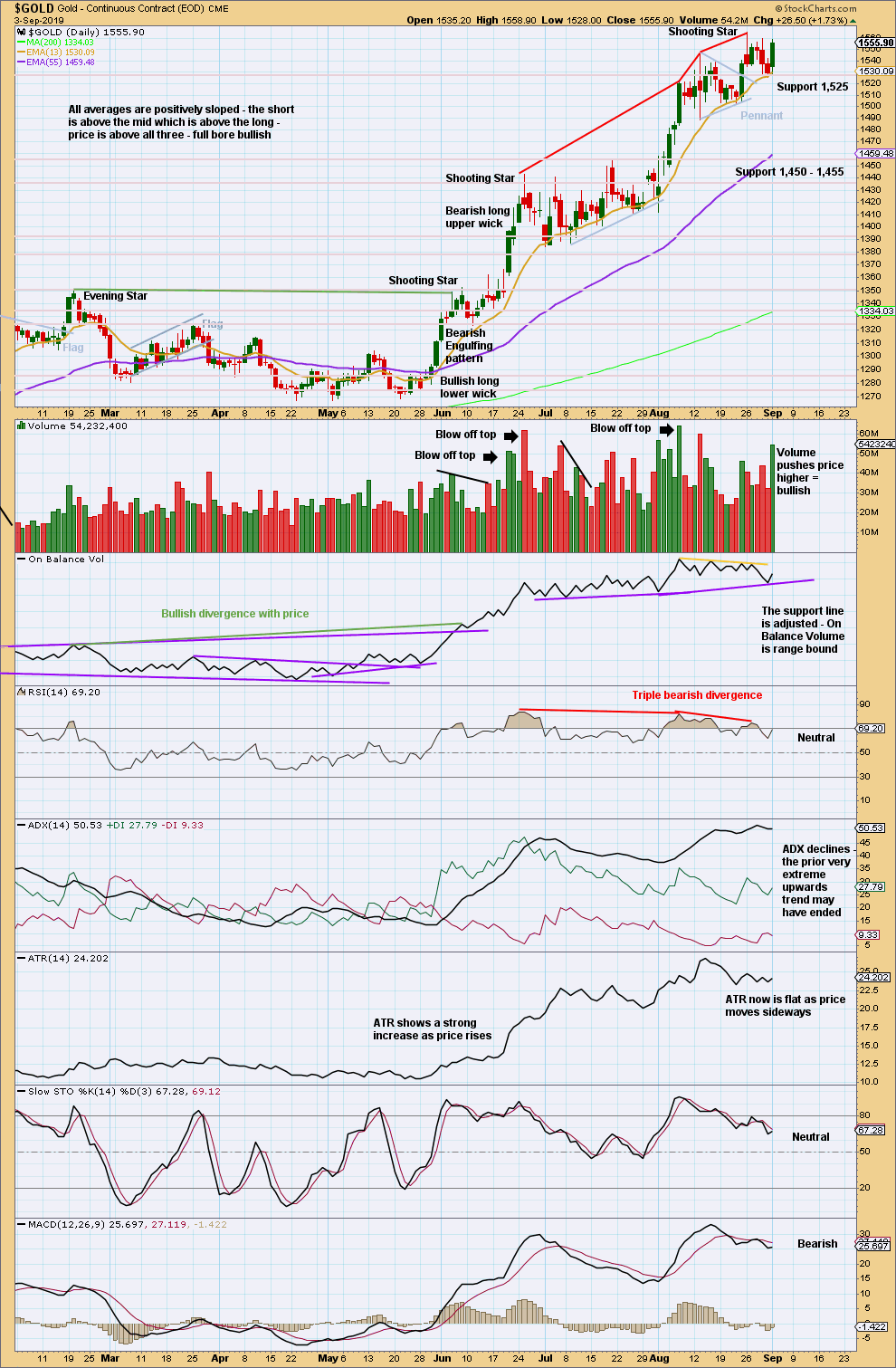
Click chart to enlarge. Chart courtesy of StockCharts.com.
When trends reach very extreme at both weekly and daily time frames, and then candlestick reversal patterns develop at both time frames, more weight may be given to the idea of a major trend change. This is especially so when RSI has reached extreme and then exhibited multiple divergence with price.
Look out for either a major trend change or a very time consuming consolidation to alleviate extreme conditions.
A strong upwards day today with support from volume is bullish, but it is very important to note that price remains below resistance and within a consolidation zone. When volume shows an increase within a consolidation zone while price is very close to either support or resistance, it can simply be part of the trading range as buyers and sellers execute orders at the limit of the range. Today’s volume increase may be followed through by another strong upwards day and an upwards breakout, but equally as likely price may turn here and swing back down to support.
Only a close above resistance at 1,565, which must have support from volume, would be bullish enough to again consider the target calculated from the last pennant pattern at 1,660.
GDX WEEKLY CHART
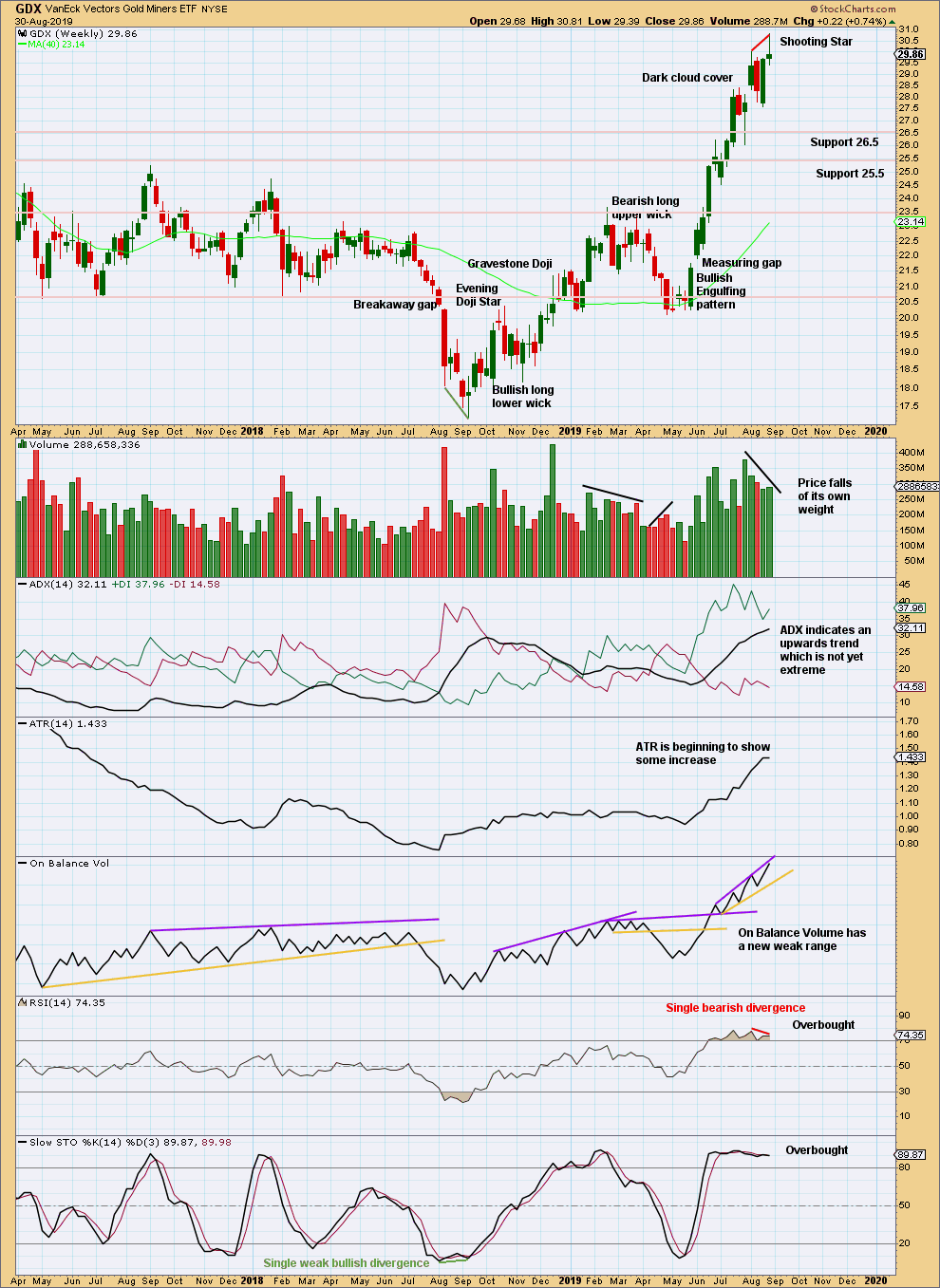
Click chart to enlarge. Chart courtesy of StockCharts.com.
This week closes as a fairly strong bearish candlestick, a Shooting Star with a long upper wick. Look out for either a trend change to either down or sideways here.
GDX DAILY CHART
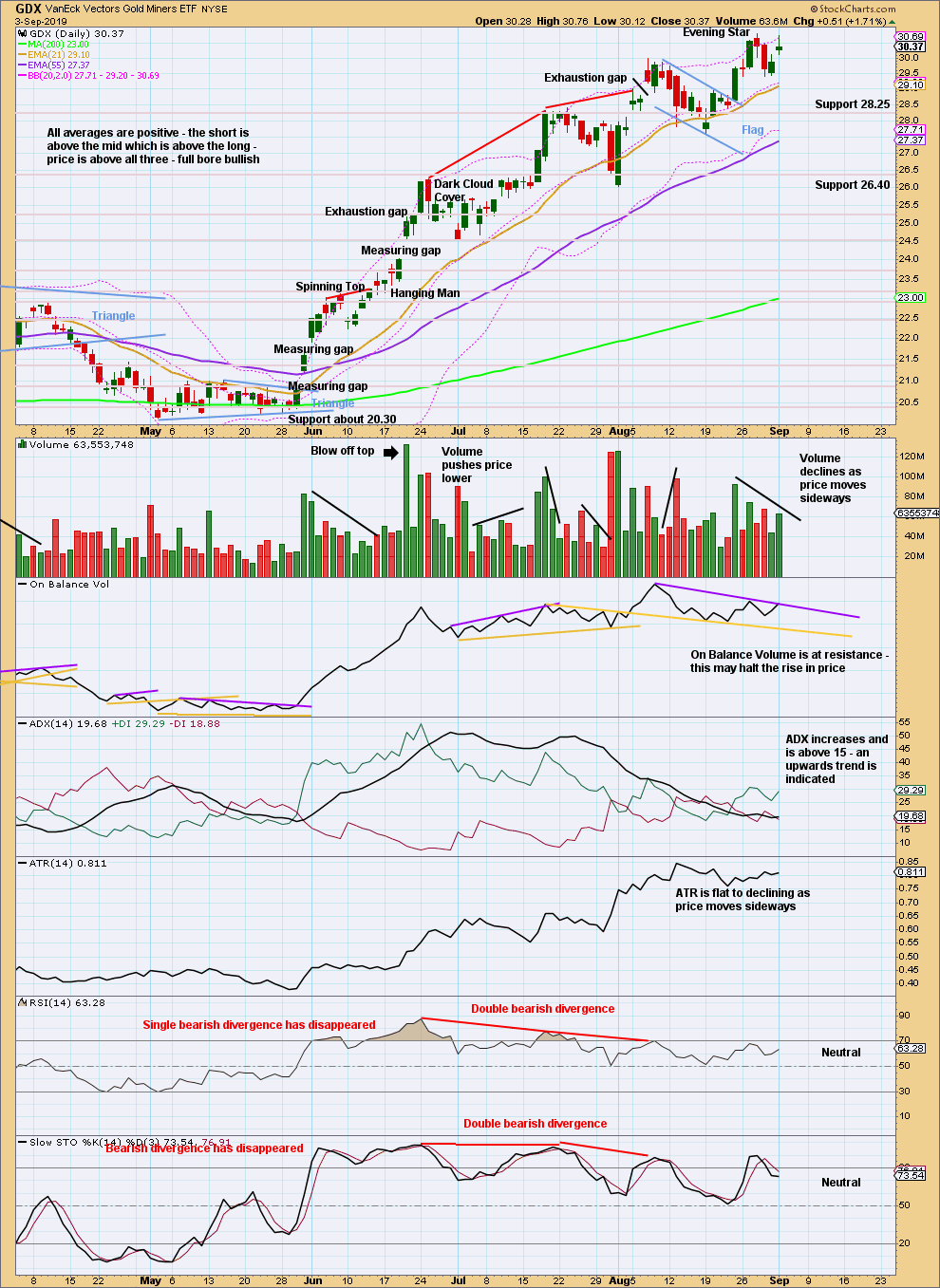
Click chart to enlarge. Chart courtesy of StockCharts.com.
The target using the flag pole is at 32.76. This may now not be met.
GDX may have seen a trend change to either sideways for a consolidation or downwards for a new trend.
Published @ 09:15 p.m. EST.
—
Careful risk management protects your trading account(s).
Follow my two Golden Rules:
1. Always trade with stops.
2. Risk only 1-5% of equity on any one trade.
—
New updates to this analysis are in bold.

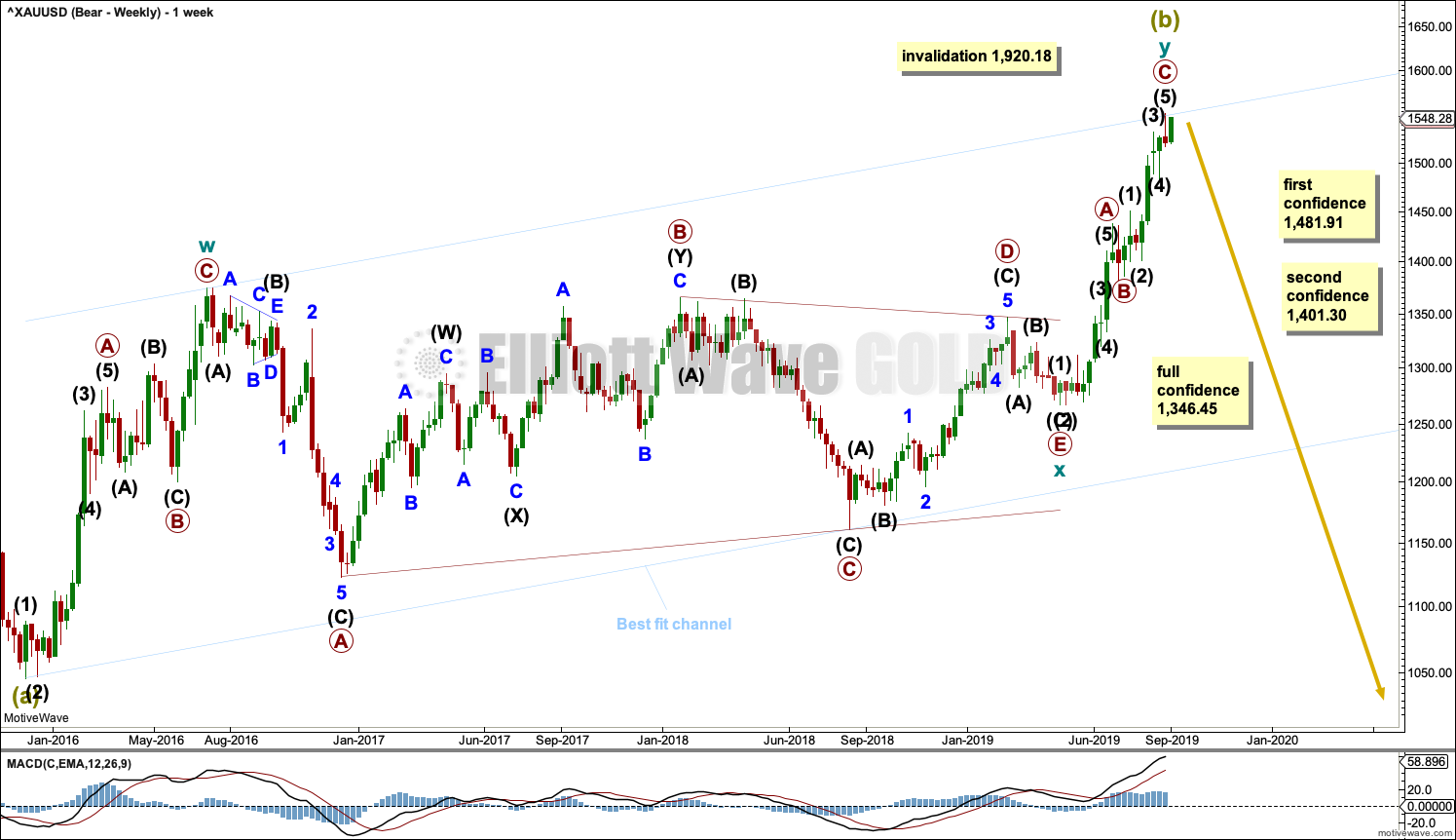

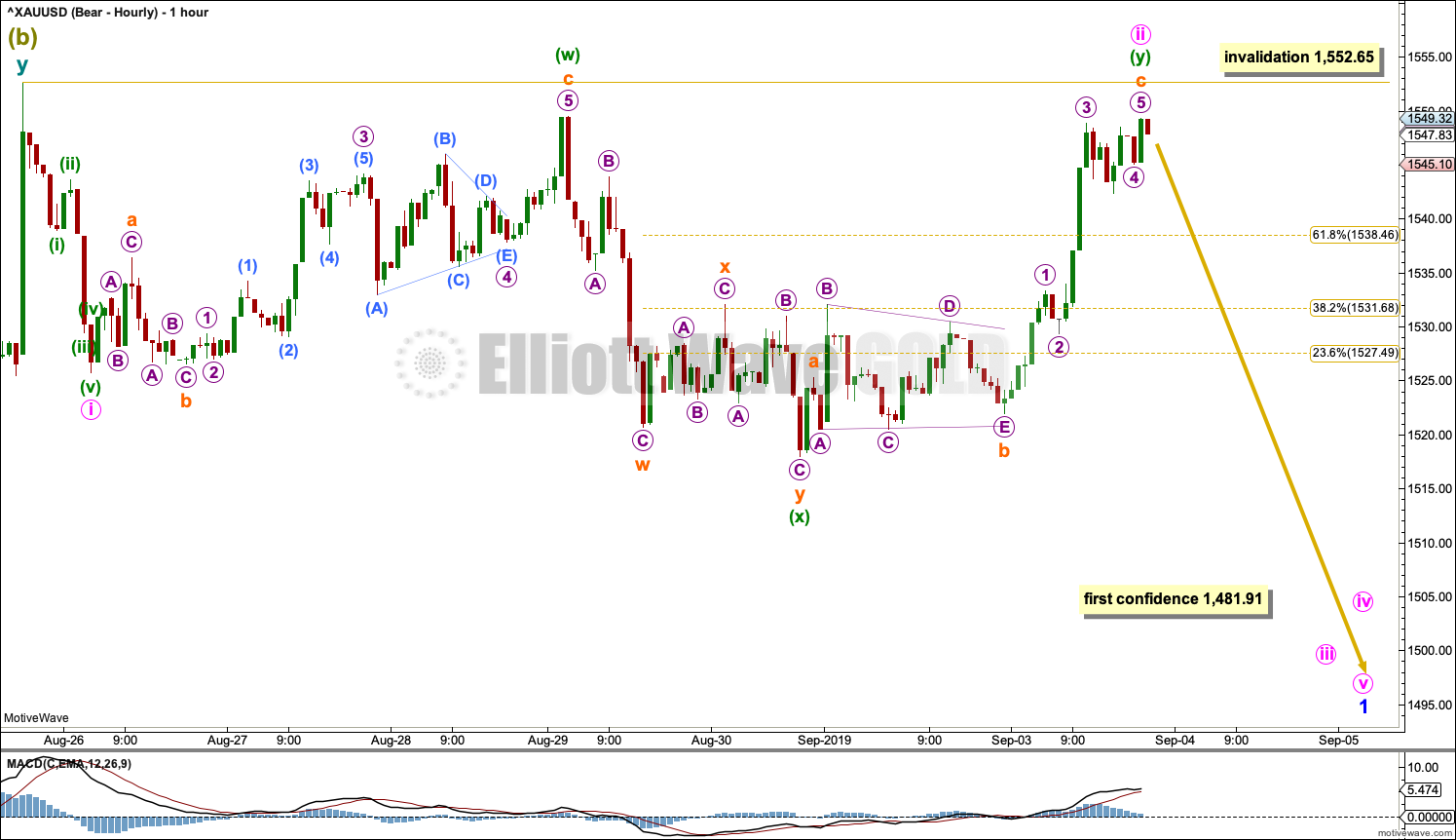
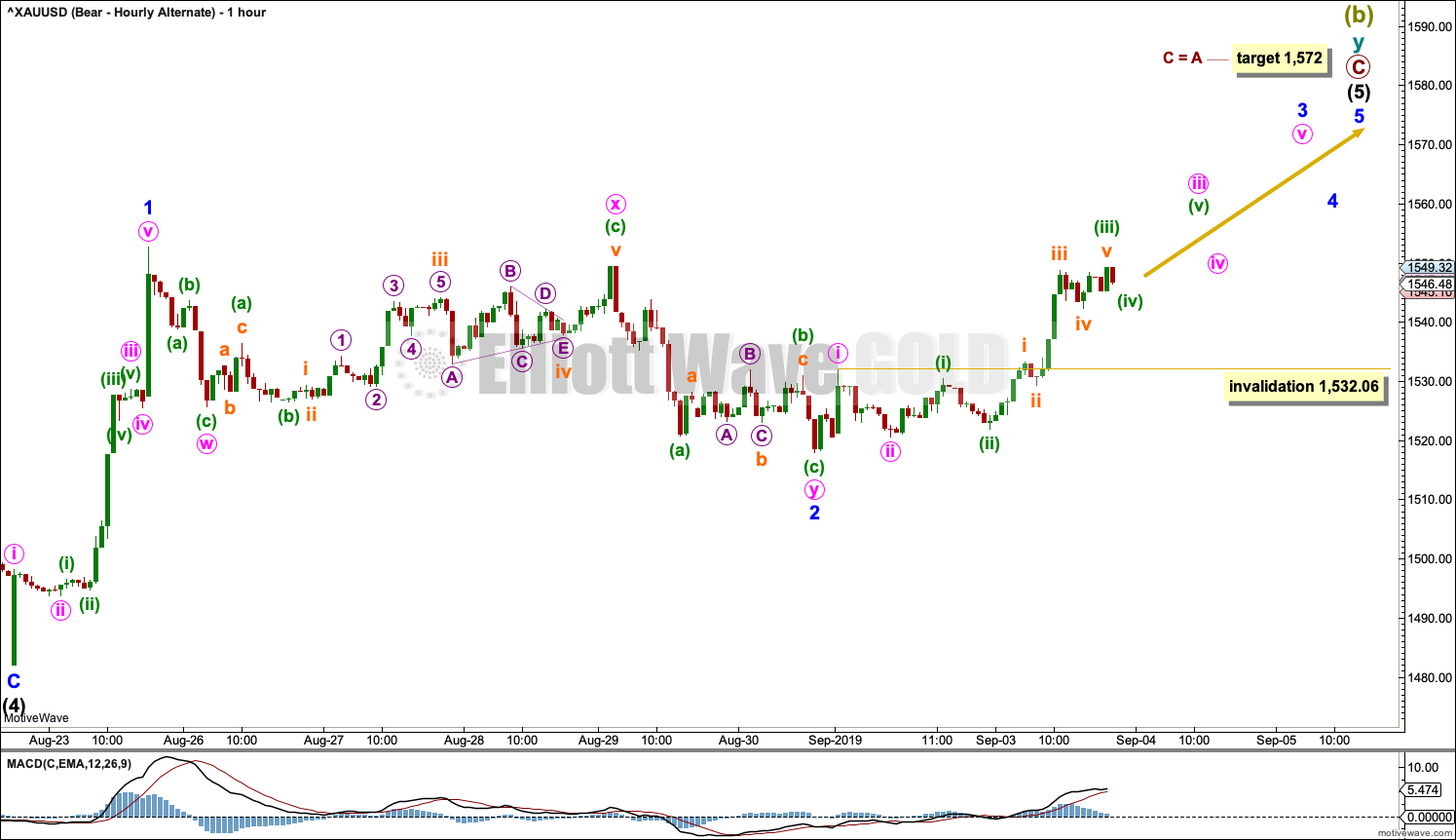
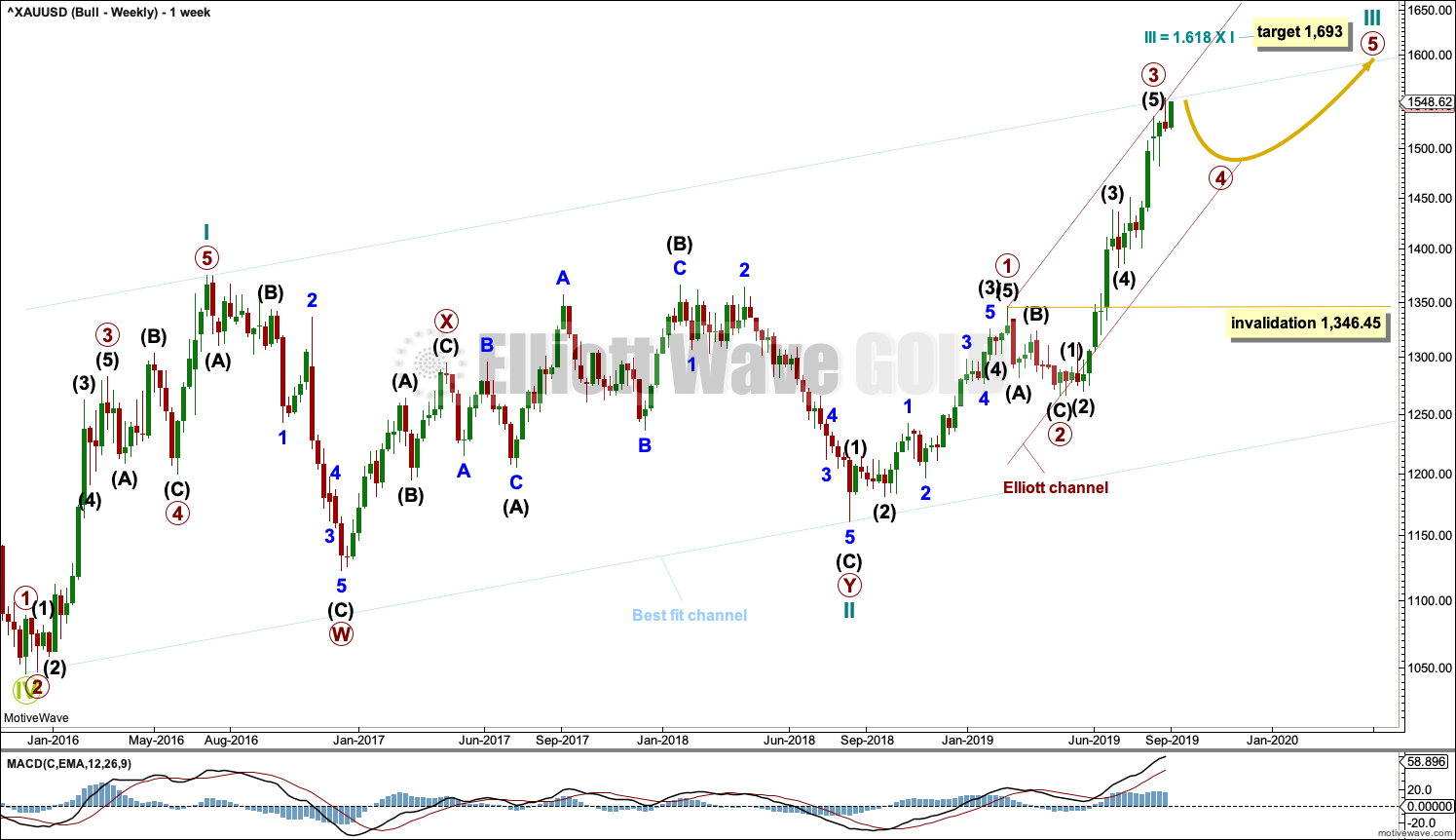
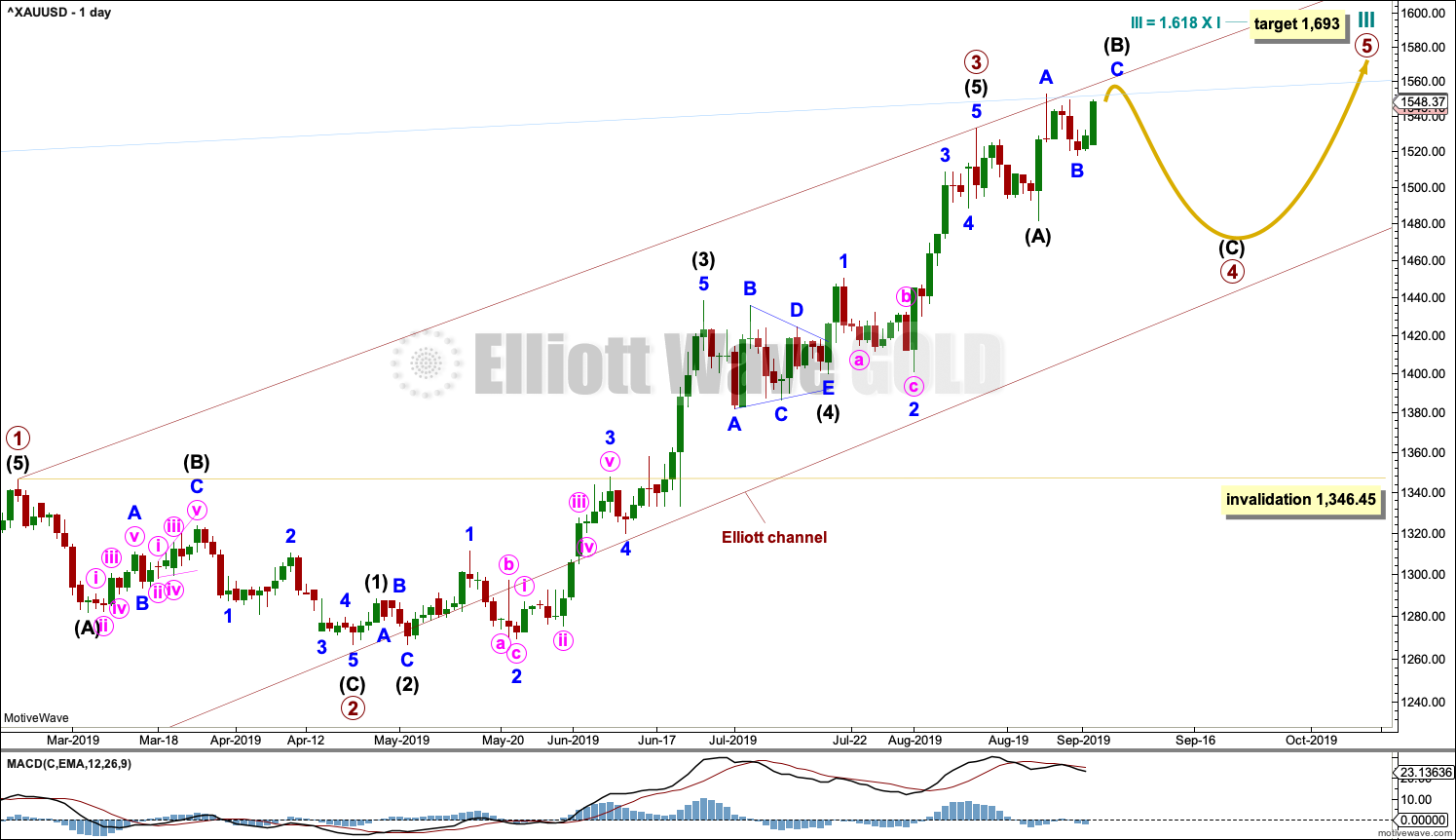
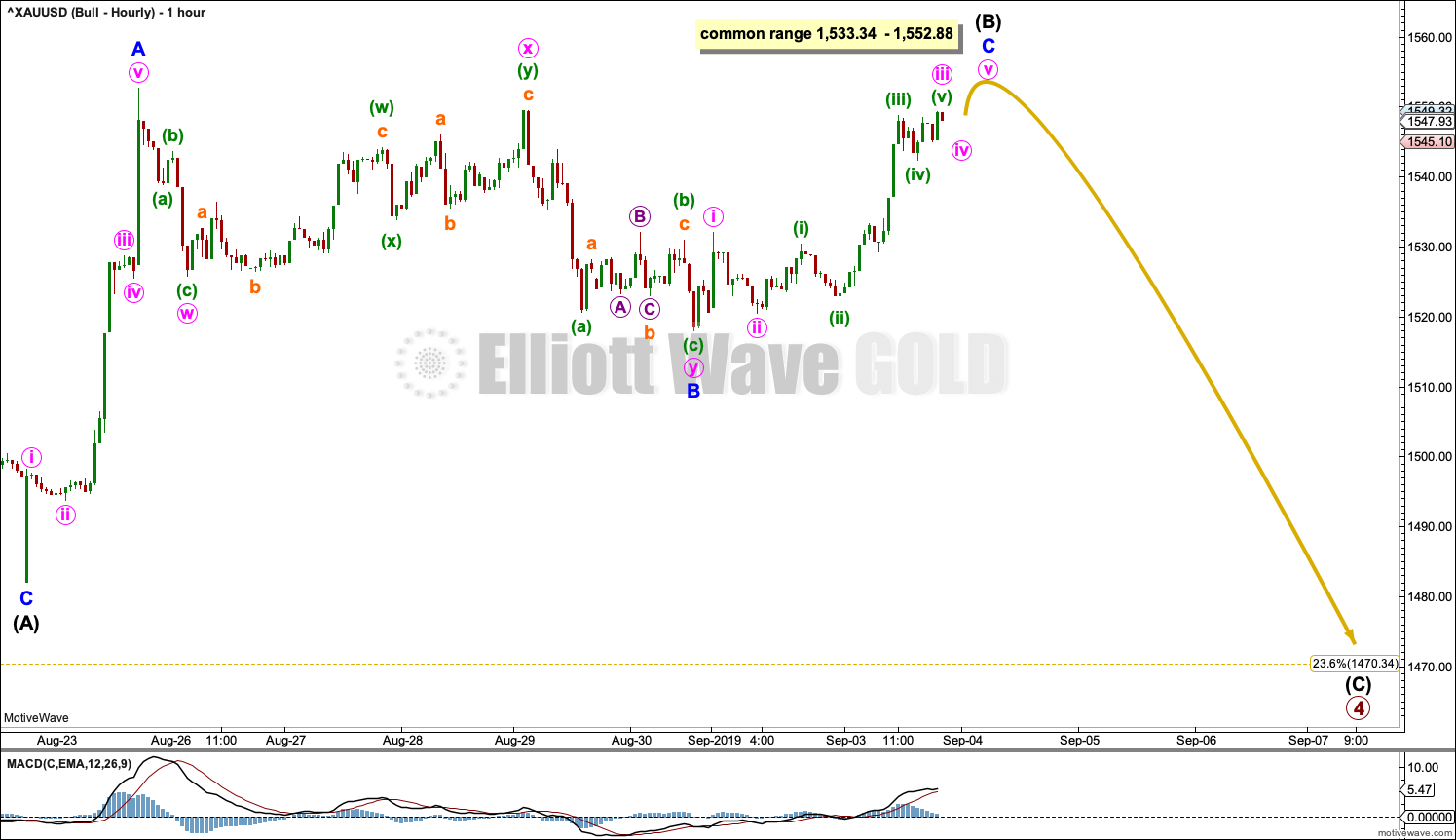
Lara, is it also possible that Minor 2 is an incomplete flat or expanded flat for the bear count?
It’s possible, yes. But it would see minor 2 at its eventual end much longer in duration than intermediate (4) one degree higher. The proportions would look… quite wrong.
The only remaining hourly chart for the bear count updated:
The bullish hourly chart updated:
Out of interest .. there is little / no talk anywhere that we could be in a huge bull trap, and we’re still in a bear market.
Of course it is a possibility, but is anyone still swaying towards this being how this is going to play out?
Seems everyone (even MarketSniper, and iGoldadvisor) have all gone bullish ..
So, does that mean we are most likely bullish, or is this the bull trap to end all bull traps ??
The Bearish Count makes much more sense IMHO. Problem is, there is no rule how high it will go :))
A contrarian might say that when everyone has switched to overly bullish, that’s when the bull market can end.
Alternate Bearish Count:
Hi Lara, Is it possible to count that last v of 5 as an ending diagonal ?
Disregard my question 😉
A series of 4/5 makes more sense
The thing what is irritating me:
Wave 1 at 23th is pointing to 1620 to 1640, but that is considerably higher than the plausible target of 1572.
I don’t know what you mean by this comment.
If you make it clearer, I can understand what the concern is, and I can see if its valid or not from my EW POV.
Which count are you referring to?
Which wave 1? (what degree) and why do you say it’s “pointing to”, do you mean a target for a third wave based upon the length of the first?
Hi Lara
I subscribe you for a while and wants to thank you for your great jobs in elliott wave.
my chart has some differences so I labeled last upwards movement like this:
what’s your opinion about this?
1. It doesn’t work with BarChart data, because the data you have there sees a low for the 22nd of August probably at 1,493 while BarChart data has a downwards spike to about 1,482 on the 22nd of August.
2. There is an overlap between your 4 and 1. This is acceptable if the structure you’re labelling is a diagonal. But the diagonal needs to be either expanding or contracting, and the trend lines need to be either diverging or converging. Those trend lines are parallel.
Also, you’ve not put this wave count into context. Elliott wave is fractal. You need to fit whatever you’re looking at into the bigger picture, so it needs more labels for the larger structure.
Thanks for your response.